Читать книгу "Broke," The Man Without the Dime - Edwin A. Brown - Страница 4
На сайте Литреса книга снята с продажи.
CHAPTER I
My Itinerary and Working Plan
ОглавлениеTable of Contents
“The heart discovers and reveals a social wrong, and then demands that reason step in and solve the problem.”
It was in the Winter of 1908–9 that a voice in the night prompted me to take the initiative for the relief of a great social wrong—to start on what to me was a great constructive social reform.
As mysterious as life itself was the following of that voice for three years. I realized fully the importance of actually putting myself in the place of the penniless man to gain the knowledge and fully grasp all that life meant to him. It came clearly to me that the shaking of hands through prison bars, and the regulation charity inquisition and investigation was idle and useless. Overcoming a sensitive dread of being looked upon as an eccentric poseur, I purchased a workingman’s suit of blue jeans, coarse shoes, and slouch hat, costing about four dollars, and became a voluntary wandering student in the haunts of the homeless and penniless.
I did not intend at first to investigate further than my own home city, Denver, but the demand reaching out, I felt compelled in the months of February and March, 1909, to visit Chicago, New York, and Washington. My visit to those cities being made exceedingly prominent by the Associated Press I received on my return home over one thousand letters from all parts of the country, and not a few from the Old World. I awakened to the fact that my plea for a Municipal Emergency Home for the city of Denver had become a national—yes, a world wide—issue. Many of these letters,—from the North, the East, the South and the West,—bore invitations to come and investigate the condition of the homeless among them. With such appeals I could not throw off the responsibilities which I had assumed, in trying to make the world a little better for having lived in it.
As the importance of my project grew upon me, my first thought was to obtain aid from influential institutions or individuals as a speedy way of realizing my dreams; but on second thought I realized fully that that was not in accord with my plan, for my institution was to be a governmental institution, and was to be created and maintained through that paternal medium. However, as an investigator I determined to test the heads of the great foundations, and the mighty masters of finance, to feel their attitude toward unemployment and governmental ownership and agencies for the betterment of social conditions. There were many champions of the crusade against tuberculosis and the white slave traffic, educational promoters, but the homeless, exposed, suffering, and penniless man or woman, boy or girl, standing ready to be employed, found no recognition nor were considered in their well-intentioned schemes. They could not see, or would not see, beyond their own useless, wasted efforts in meeting our problem of destitution.
My plan was brought to the notice of the Interstate Commerce Commission, which recognized my work as coming within the bounds of the law to the extent of granting me free railroad transportation, but left it optional with the railroads to give it or not. In my demands the New York Central absolutely ignored my request. The Pennsylvania—with smooth abuse—slapped me on the back and wished me good luck and God-speed, but could not think of carrying me for nothing. The Gould and Harriman lines were always generous, and a number of other roads occasionally.
It was a one-man, shoulder-to-shoulder battle. I carried no credentials. My plan of procedure was to go first to the leading hotel of each city I visited, because, after my investigations, I wanted to meet the leading people of that city. Arriving at my hotel I would don my emblems of honest toil—the blue jeans—and would make my study of the status of the homeless workingman of that particular city,—a study which held a message, and a message which usually startled the city. If an extended study, I usually lived at a workingman’s neat boarding or lodging house, where one in workingman’s clothes could walk in and out without comment. Armed with the array of facts I had collected, carrying my appeal for the Emergency Home, I would meet the various progressive civic societies of the city, and as far as possible leave something tangible in the minds of the members of “emergency home committees.” This plan I always carried out to the letter except, as described in my narrative, in my Hudson River study and in Cleveland, as well as my study from Cleveland to Memphis, Tenn.
Yet after all, while I might enter in the life of the penniless and endure temporarily their privations, I could only assume on my part for I knew that at a moment’s notice, in case of accident or sickness, by revealing my identity every care and comfort would be given me. Consequently I was free from that mental suffering which is even greater than the physical suffering only those can understand who toil alone, homeless, penniless, and friendless in the world.
After my first visit to Chicago, New York, and Washington in 1909, I made a visit in the same year to Pueblo, Kansas City, Boston, Philadelphia, Pittsburg, Omaha, and Salt Lake City; and in the Winter of 1910, I visited San Francisco, Los Angeles, Portland, Tacoma, Seattle, Spokane, and Minneapolis. This was followed by investigations through the South, which really ended my crusade in the Spring of 1911, although I made a brief study of conditions in Milwaukee, Toledo, and Detroit during the following Winter of 1911–12.
